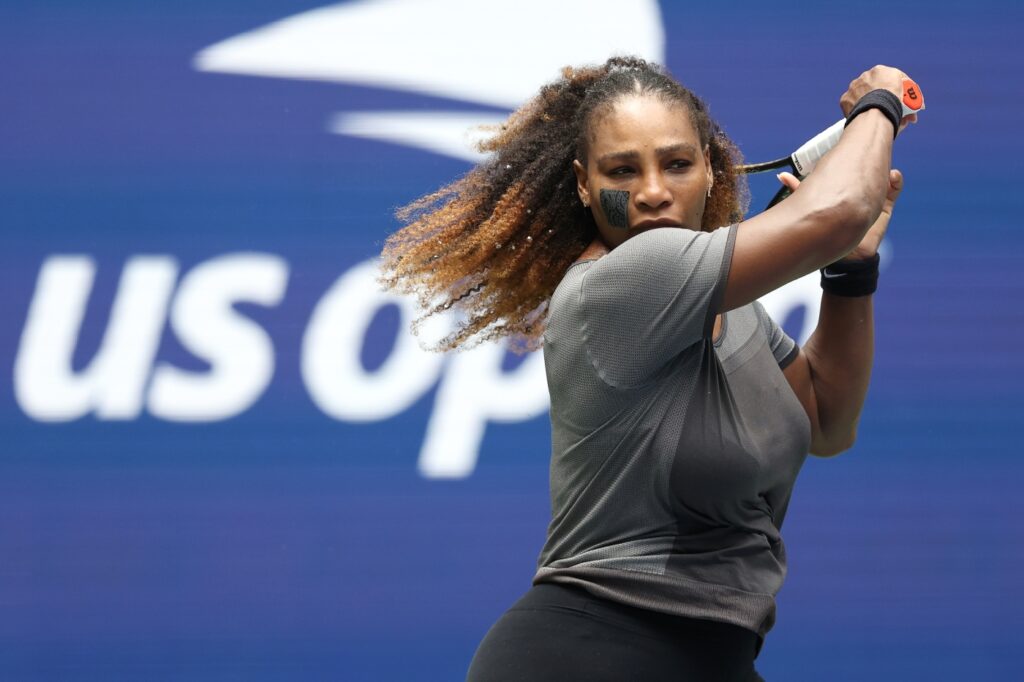
The next singles match Serena Williams loses could – gulp – be her last.
And she plays Monday. She’ll face Danka Kovinic, a 27-year-old Montenegrin who grew up watching Serena dominate on TV: No. 80 in the world vs. No. 605 headlining Day 1 of the U.S. Open, the only tournament standing between Williams and her plans to evolve away from tennis competition.
But c’mon! None of us is ready for that. Not yet.
Serena also will play in the doubles draw with sister Venus, but who doesn’t want to see the singular greatest player prolong her solo stay a little longer?
Who isn’t down to go a few more rounds with the woman who’s been such a major protagonist in American sports since even before her pro debut in 1995? A household name since she solidified her starring role four years later, at 17, when she won her first Grand Slam singles title there at the U.S. Open, becoming the first Black woman since Althea Gibson in 1958 to win a major title.
Who isn’t hoping for something befitting a Hollywood ending for the woman whose family’s story, when told on the big screen last year, earned eight Oscar nominations, including one for best picture?
Who doesn’t want to see Serena drop a 60-point swan song?
She set out, as a prescient 11-year-old, to inspire “other people to be like me.” And did she ever, influencing countless lives within the tennis community and outside it, from Coco Gauff to Naomi Osaka, from Leylah Fernandez to Emma Raducanu, from Kendrick Lamar to Michelle Obama.
Through a quarter century of exceptionalism, Serena won 23 Grand Slam titles. Add four Olympic gold medals, a total of 73 tour-level singles titles and more than six years’ worth of weeks as the world’s top-ranked player — while issuing a lifetime’s worth of I-told-you-so’s.
If sorry not sorry were a tennis star, it would be Serena, the mold-shattering, expectation-recalibrating, modern-day hero who, by slaying and speaking and rocking game-changing styles, became as much a cultural icon as a sports sensation.
The girl from Compton built an indomitable career on disappointing doubters.
Like in 2002, when a few injury-spurred withdrawals ahead of the French Open had people questioning Serena’s long-term staying power. Her response: beating Venus in the final, 7-5, 6-3, to win her second Grand Slam title and, in so doing, fulfill their father Richard Williams’ divination that his daughters would someday be ranked Nos. 1 and 2.
In 2007, Serena roared back from a months-long hiatus that sank her ranking to No. 139 and had Nike threatening to drop her. Her response: routing Maria Sharapova in the Australian Open final, 6-1, 6-2, to become the first unseeded player to win there since 1978.
In 2014, popular opinion held that Serena, soon to be 33, was vulnerable entering the U.S. Open. She’d lost early at the Austrian Open, the French Open and Wimbledon, after all. Her response: a 6-3, 6-3 victory over Caroline Wozniacki for Grand Slam No. 18.
“That’s kind of the essence of being Serena: Expecting the best from myself and proving people wrong,” she wrote in her first-person essay in Vogue earlier this month, when she let the world in on her plans to turn her focus to growing her family and businesses.
“There were so many matches I won because something made me angry or someone counted me out. That drove me. I’ve built a career on channeling anger and negativity and turning it into something good.”
Sooo … if that’s what it takes, let’s put some good old-fashioned doubt into the universe, shall we?
There’s consensus that Serena won’t seriously have a shot at going deep at this U.S. Open. She’s played only four matches this year, won just once and suffered straight-set losses against Belinda Bencic and Raducanu the past two times out.
Also, she’ll be 41 on Sept. 26, and, as John McEnroe put it, how well you play defense and recover and move “gets tougher as you get older.”
ESPN’s Pam Shriver is rooting for Serena, but she acknowledged: “It’s hard for me right now to see her making a run into the second week.”
And in ESPN’s betting preview, Brad Gilbert cautioned: “If there’s a prop bet with long odds, understand that they have long odds for a reason.”
That enough kindling for the fire?
Let’s throw a bit more on, courtesy of BBC TV analyst Barry Cowan: “She was one of those players that transcended the women’s game. But unfortunately everything is catching up on her, so she now doesn’t hit the ball as hard as the other women and physically she’s nowhere near in the same shape.”
Of course, whatever disbelief is in the air, it’ll be swiftly eradicated by the outpouring of love that Serena feels Monday evening from the 23,771 capacity crowd at Arthur Ashe Stadium.
This time it might not be about what people say Serena can’t do, but what Serena doesn’t want to do, not yet.
Certainly as the head of venture capital firm Serena Ventures, she’s got big plans to compete in the marketplace. And, as a doting mom, to play some fiery games of “Floor is Lava” with her 4-year-old daughter, Olympia.
But as she wrote in Vogue: “Alexis [Ohanian], my husband, and I have hardly talked about it; it’s like a taboo topic. I can’t even have this conversation with my mom and dad. It’s like it’s not real until you say it out loud. It comes up, I get an uncomfortable lump in my throat, and I start to cry.”
You know who would really love a storybook ending? Serena, the woman who’s been subverting expectations all this time.
